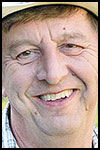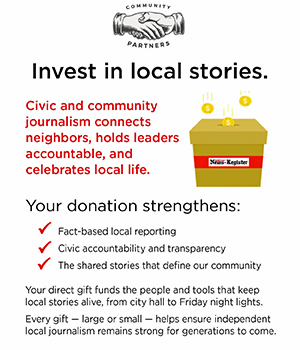Les Zaitz: Working past tribalism of the biased information age
Editor's note: The Les Zaitz cover piece was inadvertently cut short in the printed version of the Oct. 12 Viewpoints section. The complete version appears below, in its original form. The News-Register regrets the error.
Trust in the news should mean a lot to you.
When a new school is planned, you need decent information about why it’s needed, where it’s going, and who’s going to pay.
When a new highway is announced, you want details you can believe about what it’s going to do to your commute and to your neighborhood.
And when a new industry shows up in town, you want accurate information about what local government gave away in public money as the lure.
But seldom in recent history has trust in the news been so strained.
As a lifelong Oregon journalist, I put the blame largely on national media. Perhaps like you, I can’t stand to watch cable news shows that pretend to share information when they are mostly sharing invective. And the big national newspapers, such as The New York Times and The Washington Post, lean too hard into their coverage of a controversial president, dulling their ability to inform.
But that doesn’t excuse those of us who work in regional media such as The Oregonian/OregonLive or Oregon Public Broadcasting, or in truly local outlets such as the Coos Bay World and my own rural weekly, the Malheur Enterprise.
Each of us who produces journalism shares responsibility for the erosion of trust in the press.
We have partners in that blame.
You.
I’m speaking generally of American citizens.
You need no tutorial from me on how the country seems ever more divided along political, social and economic fault lines.
Americans have low trust in the media, that’s clear. But they also distrust anyone not of their “tribe” — today’s nomenclature for alliances of politics and sociology.
We need to work together to fix both. One won’t be repaired without the other, and the nation and our beloved Oregon will suffer in the absence of remedies.
It’s been assumed across the country that people gravitate toward news sources that fit their view of the world. The simple formula: liberal equals MSNBC, conservative equals Fox. A recent study revealed, though, just how much such biases distort how people read the news.
The Knight Foundation and Gallup researched bias toward news. Researchers found those in the Republican Party considered The New York Times left-leaning. When those Republicans read a story not knowing it was from the Times, their trust went up.
Those in the Democratic Party rated a story from Fox News higher in trustworthiness when they didn’t know the source of the story.
When viewed simply as journalism, this study suggests, readers were apparently tuned in to the sourcing and apparent authority of a story to judge whether they could trust it. News consumers need to be more aware of their own biases in selecting and believing news sources.
For journalists, the imperative is to produce news that can, indeed, be trusted.
Oregon reporters and editors aren’t going to influence the media giants in New York and Washington, D.C. But they can powerfully affect the local news you get across the state.
That means building on the trust you may already have in your local news outlets, whether it’s the Creswell Chronicle outside Eugene or KOBI television in Medford.
We have to first remember every day that we perform our duty in service to you and to the community. Journalists who worry about professional advancement or winning another journalism award fixate on the wrong goal. Our greatest reward is the trust of you, the reader and viewer.
Journalists have to be more open about how they do their work. That means owning up to mistakes more freely. In turn, news consumers shouldn’t clobber journalists for that honesty.
Journalists have to quit assuming that you know our professional ethics. The press has to be more explicit in explaining that it’s really after truth and fairness. It’s the exceptional editor or reporter who intentionally misstates facts or on purpose leans a story right or left. Most errors are unintentional, the result of speed, inexperience, or bad sourcing.
But as journalists double their efforts to gain your trust, citizens need to act too.
Recognize that a credible news source does make a difference in your life.
And understand that all you read and hear, particularly on the internet, isn’t news. Social media is filled with supposed authorities. And as the ranks of reporters thin, government agencies are becoming adept at putting out their own newsletters and bulletins. Public relations is no substitute for verified fact.
A year ago, city officials in Ontario sought a local sales tax. A prime justification was that crime was out of control. My weekly newspaper vetted that. Our reporters found, in fact, that serious crime had been dropping for five years. Worse yet, city officials admitted they weren’t aware of that.
Without that sort of reporting, Ontario residents would have been left to fear life in their community.
Across Oregon, journalists work to cover their communities, to serve as agents for progress. You are needed as a partner. Your subscription to a newspaper or online news source or a pledge to public broadcasting or other nonprofit news outlets is your own declaration that you want and will back those who deliver accurate, fair news.
And when the press and the people come together in that common goal, communities only get stronger. Here, in Yamhill County, that can lead to community decisions that make McMinnville or Carlton or Dundee a better place to raise a family, educate kids, and own a business.
Linfield Speech
Celebrated investigative journalist Les Zaitz will speak on the prospects for journalism from 12:15 to 1:15 p.m. Wednesday, Oct. 24, at Linfield College. The title of his talk is “Regaining Trust — Job No. 1 for the Media.” Open to the public at no charge, it will be held in Riley Hall 201.













Comments